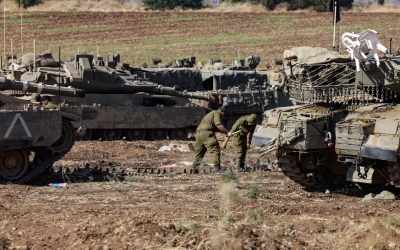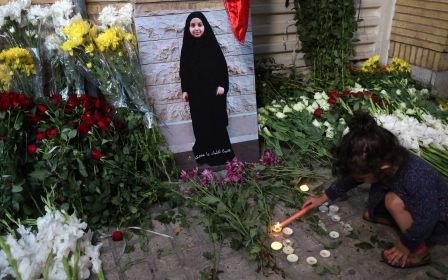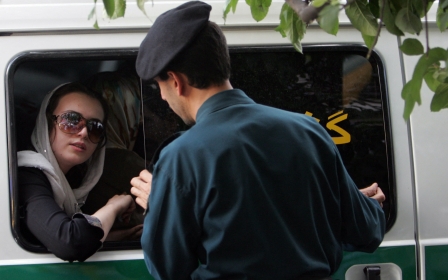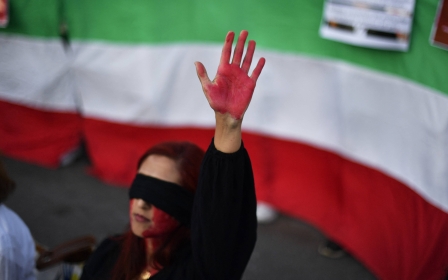Israeli press review: 'We don't want Arabs in school'

Arabs, not in our school
Last month, a Palestinian seventh grader studying at Zilberman High School in Beersheba in Israel was expelled from school after students claimed she referred to Israeli soldiers as murderers and said that "there are children in Gaza too."
Today, the 12-year-old tried to return to school. She was greeted by many students who chanted: "We don't want Arabs in school."
The student's father told the Israeli news site Ynet that his daughter did not call soldiers murderers, but only said "that there are children killed in Gaza."
"Why doesn't the school administration issue a clarification that the things attributed to my daughter are not true?" he said.
New MEE newsletter: Jerusalem Dispatch
Sign up to get the latest insights and analysis on Israel-Palestine, alongside Turkey Unpacked and other MEE newsletters
Beersheba's deputy mayor, Shimon Tobul, called for the student's parent's citizenship to be revoked and for them to be banished from the city.
"[There are] growing up in our neighborhoods, among our children, new Nukhba terrorists," he said, using a term referencing members of Hamas.
"There must be deterrence and strong punishment. Only in this way they will understand who is strong and in charge."
The student, who spoke to Haaretz immediately after her suspension, said that during a discussion in class, she said that there were small children suffering from hunger and dying in Gaza.
As soon as the lesson ended, students began attacking her.
"The students started telling me, 'Our soldiers don't murder,' even though I didn't say that...others cursed me."
A chance for 'reshaping' Lebanon
On Monday, the Israeli army announced that it had begun a "limited" ground operation against Hezbollah in several villages in southern Lebanon. The objective of the operation, according to the military, is to enable the return of Israeli residents evacuated from the north - but comments from some quarters suggest a wider plan.
"We have a great privilege to write history as we did in Gaza here in the north," the commander of Israel's Egoz commando unit told the unit's soldiers before the start of Lebanon operation.
In a video distributed by the Israeli military's spokesperson, the Egoz unit commander continued: "Since 2006, we haven't manoeuvred in Lebanon, so this is a fundamental matter. I trust you and am proud of you. We continue to write history."
The Israeli operation in Lebanon has American support, according to Mike Herzog, Israel's ambassador to the United States.
"The American administration… did not limit us in time. They, too, understand that following [Hezbollah leader Hassan] Nasrallah's assassination, there is a new situation in Lebanon and there is a chance for reshaping," said Herzog.
This morning, the Israeli army's Arabic spokesperson called on residents of several villages in southern Lebanon to evacuate their homes.
A safe zone free of grandmothers?
Prominent Israeli journalist Ben Caspit has told Israeli radio what kind of "day after" he would like to see in Lebanon after the end of military operations.
"The situation should be like this - every missile, rocket, Radwan activist or grandmother of a Radwan activist who entered south of the Litani must die at that moment, even if there is a treaty and the guest houses are full," he said, referring to Hezbollah's special operations force.
"Everything else doesn't interest me."
Similar remarks were made by Gabi Naaman, head of the Shlomi local council, near the border with Lebanon.
"The entry of [Israeli] soldiers into southern Lebanon is imperative for our security… The areas of southern Lebanon are plowed with tunnels and many weapons depots that endanger our communities, and therefore it is necessary to cleanse the area and eliminate the terrorists in southern Lebanon."
Caspit, one of Israel's most senior journalists and considered to be one of the fiercest opponents of Israeli Prime Minister Benjamin Netanyahu, celebrated the assassination of Hezbollah leader Hassan Nasrallah on Saturday by raising a glass of arak on live TV.
"I am very happy about the passing of this man," Caspit said on air.
Prior to that, Caspit praised Israel's pager attack in Lebanon.
Caspit called the Israeli operation "Eid al-Beeper" in a pun on Eid al-Fitr designed to mock Hezbollah.
No civilians in south Lebanon
Avigdor Lieberman, an Israeli opposition politician, has suggested that anyone left in southern Lebanon following an order to evacuate should be considered Hezbollah.
'All the Lebanese villages in this range must be flattened, including al-Adaisah and Kafr Kila'
- Avigdor Lieberman, Israeli politician
"Before our soldiers enter southern Lebanon, their security must be ensured and all the villages on the line of contact must be destroyed from the air. It must be understood that anyone who remains in the area is not an uninvolved person, but a Hezbollah operative," he wrote on X, formerly Twitter.
Lieberman is one of Israel's most popular politicians. According to a Channel 12 News poll published yesterday, his party would win 14 seats in an election, making it the fourth-largest party in the Knesset.
During a visit to Giladi village in northern Israel before Nasrallah's assassination, Lieberman said: "What is needed now is the creation of a perimeter of 10 kilometres in order to prevent effective fire... all the Lebanese villages in this range must be flattened, including al-Adaisah and Kafr Kila."
Earlier in December, Lieberman was interviewed by Kan. In the interview, Lieberman said, "Israel must control southern Lebanon up to the Litani River – until Beirut has a government that exercises its sovereignty. Any other arrangement will bring us back to the same place in a few years."
Middle East Eye delivers independent and unrivalled coverage and analysis of the Middle East, North Africa and beyond. To learn more about republishing this content and the associated fees, please fill out this form. More about MEE can be found here.






